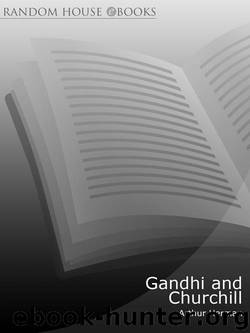Gandhi and Churchill by Arthur Herman

Author:Arthur Herman
Language: eng
Format: epub
ISBN: 9781409063636
Publisher: Random House
Chapter Nineteen
CONTRA MUNDUM 1931–1932
The loss of India will be the death blow of the British Empire.
WINSTON CHURCHILL, april 1931
ON A CHILLY WET DAY IN mid-September 1931 a small, bald bespectacled man in a dhoti and homespun cloak descended the gangplank at Folkestone Harbour. A crowd of press reporters and admirers greeted him, including members of Parliament and the Dean of Canterbury. They were expecting to meet a New Age Hindu saint, an exotic sentinel from the spiritual East. Mohandas Karamchand Gandhi, the Mahatma, did not disappoint them. For the next two and a half months his bald head, naked legs, and what the press called “his loincloth and shawl” would become a familiar sight in the streets of London.1
This was Gandhi’s fifth and final visit to London, the city he had once admired as the center of civilization. On the first visit he had been the ambitious law student. On the second, in 1906, he had been the earnest petitioner from South Africa, meeting Undersecretary Winston Churchill in frock coat and stiff collar. He had been a petitioner again in 1909, albeit a disillusioned one. On his last visit, in 1914, hardly anyone even noticed his presence.
But now Gandhi was a world figure. International press coverage of the Salt March and civil disobedience campaign had made him famous. The book by Romain Rolland (he and Gandhi would finally meet on this trip) and admiring biographies like Gandhi: The Dawn of Indian Freedom and “The Naked Fakir,” along with Mahatma Gandhi at Work by Charles Andrews and Mr. Gandhi: The Man by Henry Polak’s daughter Millie, prepared the way. Hundreds gathered in a driving rain at the reception for him at Friends House in Euston Road.
“I represent, without any fear of contradiction, the dumb, semi-starved millions of my country, India,” Gandhi told them. “The Congress wants freedom, demands freedom for India and its starving millions.” Another mob of journalists and photographers met him at Kingsley Hall, the pacifist settlement house founded by a former Sabarmati pilgrim, Muriel Lester. It would be home for Gandhi, Sarojini Naidu, and his secretary Desai for the next ten weeks.2
To his Western admirers, Gandhi seemed a serenely confident, even triumphant presence. But he was racked by doubts; he sensed from the beginning that this trip would be a failure. Increasingly he was realizing that what he wanted, and what the rest of the world wanted, were two different things. The same was true of the man who had emerged as his fiercest foe, Winston Churchill.
“What if” is a game that historians like to play, but with a serious purpose. Imagining what might have happened but didn’t can sometimes reveal how small events or large personalities can suddenly shift the balance of historical forces in a new direction.
If, for example, the Tories had won the 1929 election instead of Labour, Winston Churchill would very probably have become secretary of state for India.3 The whole tenor of Indian policy for the next two years would have taken an abrupt shift as a result.
Download
This site does not store any files on its server. We only index and link to content provided by other sites. Please contact the content providers to delete copyright contents if any and email us, we'll remove relevant links or contents immediately.
| Africa | Americas |
| Arctic & Antarctica | Asia |
| Australia & Oceania | Europe |
| Middle East | Russia |
| United States | World |
| Ancient Civilizations | Military |
| Historical Study & Educational Resources |
The Sympathizer by Viet Thanh Nguyen(4371)
The Rape of Nanking by Iris Chang(4189)
World without end by Ken Follett(3457)
Ants Among Elephants by Sujatha Gidla(3450)
Blood and Sand by Alex Von Tunzelmann(3181)
Japanese Design by Patricia J. Graham(3152)
The Queen of Nothing by Holly Black(2573)
City of Djinns: a year in Delhi by William Dalrymple(2542)
Foreign Devils on the Silk Road: The Search for the Lost Treasures of Central Asia by Peter Hopkirk(2451)
India's Ancient Past by R.S. Sharma(2438)
Inglorious Empire by Shashi Tharoor(2424)
Tokyo by Rob Goss(2419)
In Order to Live: A North Korean Girl's Journey to Freedom by Yeonmi Park(2371)
Tokyo Geek's Guide: Manga, Anime, Gaming, Cosplay, Toys, Idols & More - The Ultimate Guide to Japan's Otaku Culture by Simone Gianni(2352)
India's biggest cover-up by Dhar Anuj(2342)
The Great Game: On Secret Service in High Asia by Peter Hopkirk(2325)
Goodbye Madame Butterfly(2241)
Batik by Rudolf Smend(2169)
Living Silence in Burma by Christina Fink(2052)
